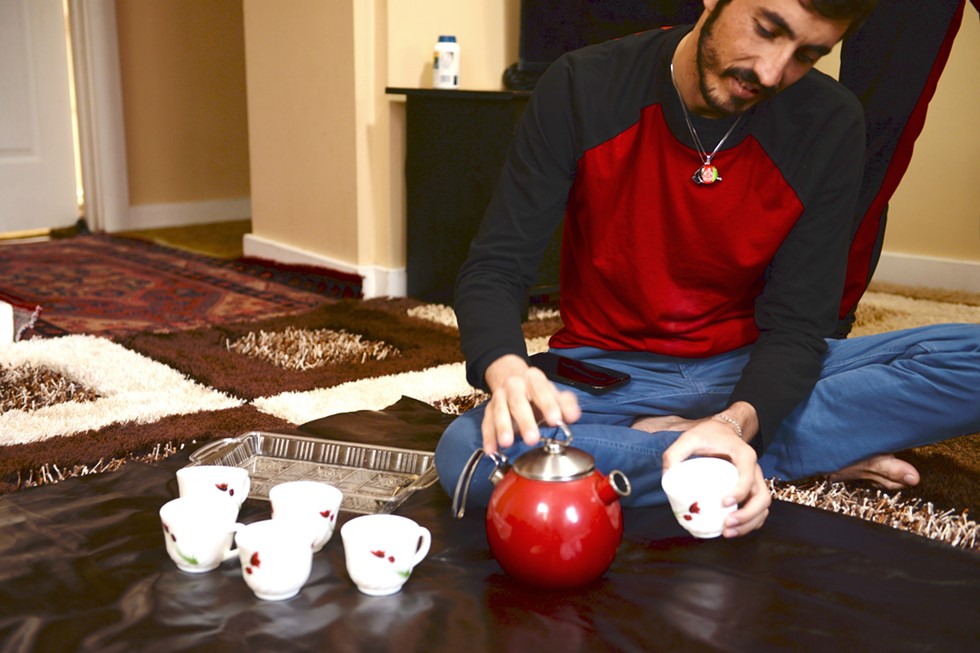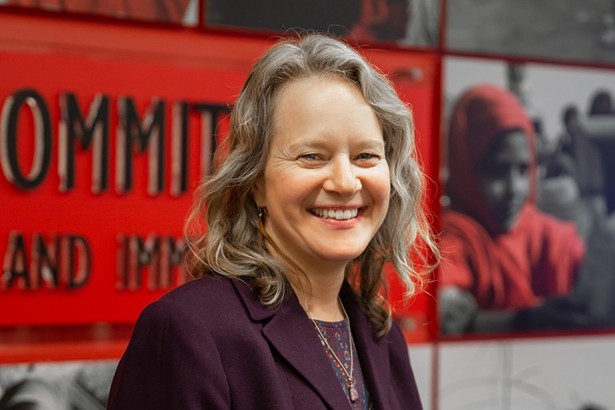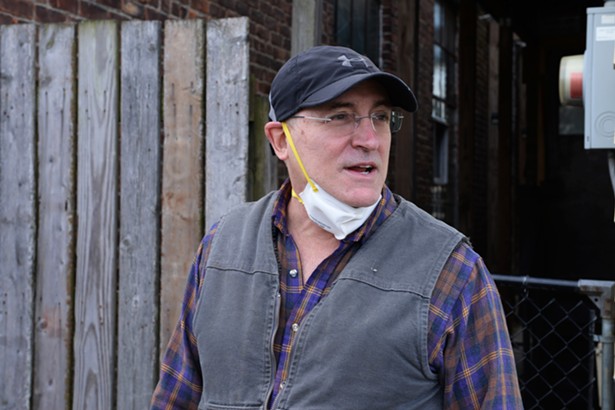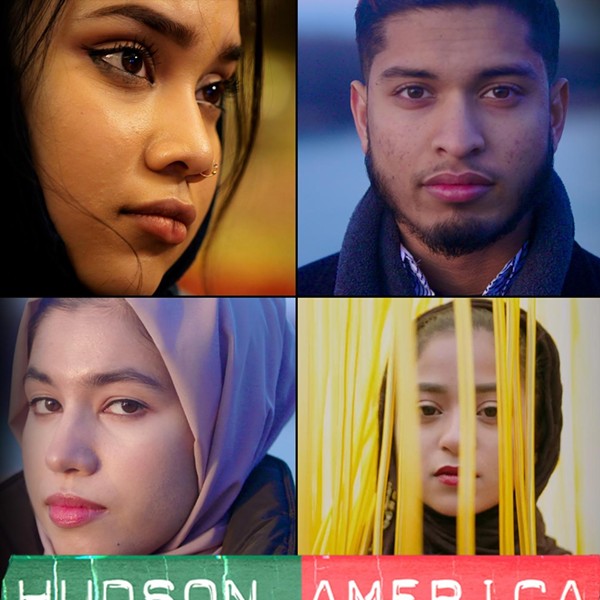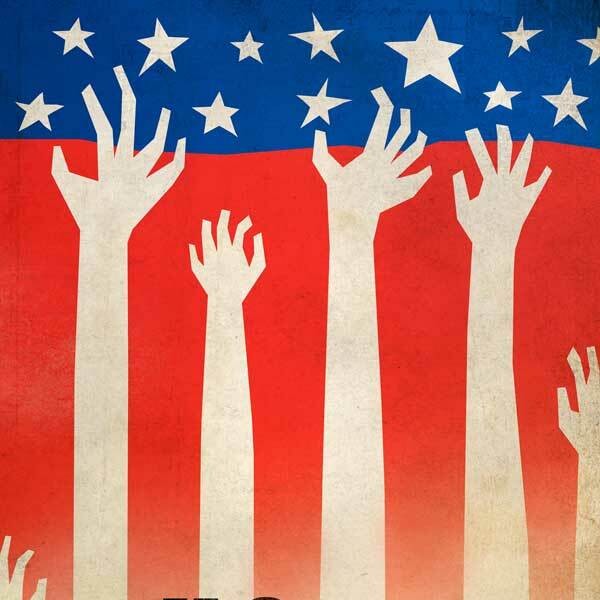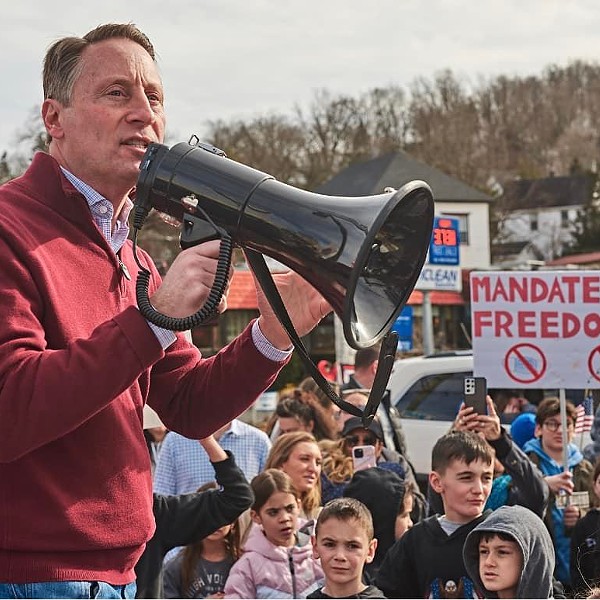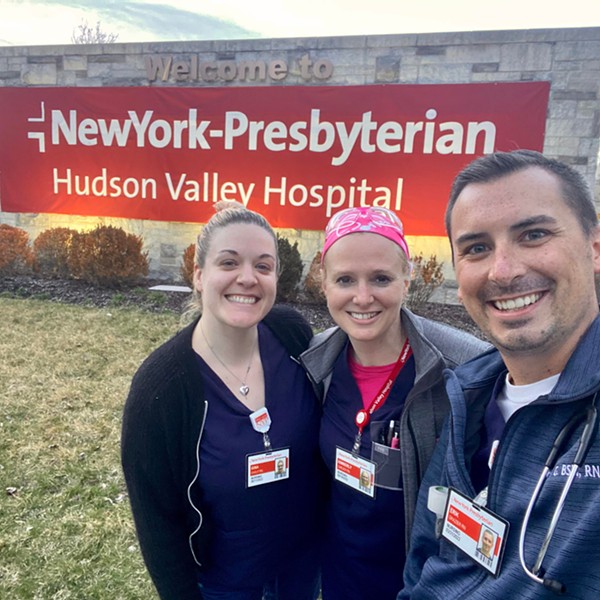Noor Khan sits cross-legged in his empty Albany living room, his expressions jittery with thought. “If you had the time, you could write 10 sad books about my life,” he says. “About how I came to America.” For years, he had been a soldier fighting alongside the United States army in Afghanistan. Now he found himself in Albany’s West Hill neighborhood, sharing a cramped three-bedroom apartment with 12 family members who had come to America two years earlier.
The days leading up to his evacuation haunt Noor. For 10 consecutive nights near the end of August, the Taliban surrounded him and many other pro-government soldiers working for the US, shooting almost constantly and outnumbering them 2,000 to 300. “They had us covered from four sides, so we couldn’t get out,” he says. “The condition was horrible.”
Noor’s 10 siblings and his parents had left Afghanistan in 2019. His father had worked as a provisional officer for the American military in the country, but wanted a safer environment for the growing household. Noor, 24 at the time, chose to stay. He hoped to build a family of his own in Afghanistan, and was not prepared to leave behind the country he had fought to defend.
But after the Taliban overran the US and Afghan allied forces this summer, Noor escaped to Kabul, where a military plane took him to Turkmenistan. That would be the first of six stops preceding his arrival in Albany: Georgia, Germany, Washington DC, Virginia, and New Mexico, where he was placed in a resettlement camp in Albuquerque. After hearing Noor was there, Hafeez, his older brother, drove the 2,000 miles from Albany, intent on bringing Noor back with him. But Hafeez was turned away, because Noor hadn’t yet received his vaccination paperwork. It took two more weeks for his documentation to be processed. By then, Hafeez had returned to Albany and was forced to purchase a $300 flight to New York for Noor, an unanticipated financial strain for the brother who had been working as a delivery driver, barely making minimum wage.

But Noor bears heavier burdens, ones with a price that can’t be rendered in dollars. He was evacuated as an asylum seeker and not an asset to the American military, which means that his wife and kids weren’t allowed to join him. Without a passport or any viable means of exit, they remain in Afghanistan. “I don’t know if my wife is eating, I don’t know where my children are living,” he says. Early in our conversation, after learning that I was Lebanese, he asked if I could find a way to get his family to Lebanon.
Because of his decision to fight back against the summer offensive, Noor says that he has become an enemy of the Taliban, which he fears could have fatal consequences for his family. “In Afghanistan, if you have a problem with me, you have a problem with my whole family. Given the chance to kill my brothers, my wife, my children, it’s not a problem. They won’t hesitate.” In the four months it took the Taliban to reconquer the country, at least 715 civilians were killed, according to The New York Times.
I asked Noor if he thought there was a chance his family could escape to the United States, like he did. He chuckles. “I don’t even know, for myself, how to get a Green Card, how to file for Social Security,” he says. “So for them, I don’t know. I don’t know.”
The Urgency of the Moment
The journey Noor Khan and his siblings have undertaken has become a newly urgent topic in America’s national conversation about migration. In the months following the Taliban’s takeover and the US’s evacuation of Afghanistan, Governor Kathy Hochul has said New York State is expected to welcome as many as 1,143 Afghan refugees. About 250 will end up in Albany, according to the US Committee for Refugees and Immigrants (USCRI), up from an original projection of 100. (Estimates for the mid-Hudson Valley are hard to come by, though in late November, a family of seven was resettled in New Paltz.)
Many of those refugees are part of the Special Immigrant Visa program, an initiative designed for Iraqi and Afghan nationals who have worked as interpreters or translators for the American army. It affords them and their families entry to the United States and a way around the often time-intensive process of proving persecution and refugee status. With the US military now completely out of Afghanistan, these visa applicants have risen exponentially, both as a byproduct of the devolving situation and the lack of available work for Afghan interpreters and translators. Jill Peckenpaugh, the Albany field office director for USCRI, told the Albany Times Union that this year her office has received “by far” the most SIV requests in the state. New York accepted 108 refugees on SIVs from Afghanistan between October 1, 2020, and July 31 of this year, according to the Refugee Processing Center. USCRI expects an additional 400 refugees next year, 25 percent of them SIV candidates.
While much of this uptick is a result of the deteriorating situation in Afghanistan, the end of Donald Trump’s presidency has also meant a shift in the stream of refugees. In 2020, Trump capped American refugees at 15,000—the lowest figure since the 1980 Refugee Act took effect. In Albany, that meant average resettlement figures hovered right around 100. Since Joe Biden has taken office, the refugee cap has returned to what it was during the Obama administration, right around 125,000.
The cap didn’t solely affect entrants into the United States—for the many organizations that help with resettlement, it also stunted any expansion efforts. “Donald Trump got in our way,” says Maria Hoehn, who runs the Consortium on Forced Migration, Displacement and Education, a five-school initiative that aids in collaboration between refugees and academic institutions. “It was a nightmare. We had worked with Churchwell Services to open up a new resettlement office in Poughkeepsie…but they had to close the office. With Trump not allowing much resettlement, they had no business.”
A number of organizations, including Catholic Charities and Hearts & Homes for Refugees, were also forced into significant reductions during the Trump years. Now, with a desperate need for refugee aid, many smaller organizations in the Hudson Valley face increased pressure.
These kinds of hurdles even impacted USCRI, which has been trying to expand since Biden was elected. “Certainly the last federal administration years have decimated the infrastructure for refugee resettlement,” Peckenpaugh says. “Both domestically and around the world.”
Failing Institutions
USCRI, an organization funded primarily through government grants, has functioned as the starting point in the resettlement of almost all Afghan refugees. The group’s focus is broad—it advertises housing, legal and social work, and medical advocacy as primary services—and its reach is undeniable. Every person I spoke to reporting this piece—every refugee, immigration attorney, and local resettlement worker—has spent significant time interacting with USCRI. They describe a complicated relationship to the massive organization.
Among the smaller groups in Albany, criticizing USCRI felt like whispering complaints about a dictator in a one-party state. While critiques of USCRI’s work were easy to come by, they were always followed with justifications. The organization had too much control over the resettlement process, which made cutting ties with them too big a risk. One local volunteer told me that she reached out to Peckenpaugh five times in an attempt to learn more about opportunities to help incoming Afghan refugees. After five unanswered emails, she took matters into her own hands and contacted local mosques to find donation sites and spaces of support.
These criticisms aren’t limited to simply volunteers or local organizers. The loudest voices are the refugees themselves.
Shakiba and Mansour Saadat were just 21 and 16 years old, respectively, when they moved to Albany five years ago. Their journey was a difficult one. Their father was a doctor in Kabul who had developed a number of powerful enemies in the country, they say. In 2016, he was murdered, and the family fled to Pakistan. Soon after, they sought asylum in the United States.
Shakiba and Mansour, along with their three siblings and mother, left behind a life in Afghanistan that defies the traditional refugee stereotype. Shakiba says they had everything they could have wanted in Kabul, and even their current home in Albany is flush with symbols of success: elegant grey couches, a silver-bedazzled center room table, a large flat-screen television. It’s a far cry from Hafeez and Noor Khan’s barren living room. To the outside observer, little separates their house from that of any middle-class family. But the siblings are clear that USCRI had nothing to do with their relative comfort. They feel like the success of their resettlement—USCRI’s entire objective—came in spite of the organization, not because of it. “They’re such assholes,” Mansour says.
Shakiba recalls a moment from their first week in Albany when their mother developed a sudden kidney infection. Still limited with their English, they couldn’t figure out how to take her to the hospital. In a panic, they called USCRI, asking for help. Someone from the organization took them to the nearest hospital but left them with no instructions on what to do and no way of returning home. After treating their mother, nurses at the hospital gave the siblings a Medicaid number that could get them a taxi home. But with limited ability to communicate and little familiarity with Albany, even that phone call was a monumental task. “It was just so hard for me to explain to them where I was,” Shakiba says. “I couldn’t tell them where I wanted to go. Somehow, they figured out that we were at a hospital and we needed to get home.”
There were other slights. It was November when the family moved to Albany, and they were unaware of upstate New York’s freezing winters. “When we came up, USCRI brought us these shitty blankets and charged us double the price for them,” Mansour says. “So you hear about the government giving us this money; well, they would just take half of it that way.” The family urged the center for better blankets, or even the ability to turn up their heating. USCRI said they had everything they needed. For the first few days of that winter, the family could barely bear the cold. They wore winter coats around the house until finally buying space heaters for each room.
That first home was also a nightmare, they say. USCRI placed the family of six in a two-bedroom house. The townhouse, a two-story standalone, didn’t have flat ceilings on the second floor, which “basically made it impossible to even walk upstairs,” Mansour says. The building also had a mouse infestation. “It was mice everywhere, everywhere,” Shakiba says. “They were just always running around.” When the family asked USCRI for help moving, they were told that this was the best house available.
Many of these issues are indicative of broader financial and systemic issues that plague resettlement. Federal funding to the Department of Social Services and to USCRI has not kept up with rising housing costs. That kind of stagnation can spur many of the problems that have haunted the Saadats. Peckenpaugh and Alexandra Plazas Rocha, USCRI’s senior communications director, say that they are working to grow from these mistakes. “We’re here to serve our clients in the best way possible,” Rocha says. “We are using every opportunity, in our daily work, to improve and to learn from everything that we do, and to work to provide [refugees] with better services.”
Still, that aspiration for growth doesn’t shield USCRI from blame. Shakiba reached out to Peckenpaugh, the organization’s director, trying to complain about their living situation. Peckenpaugh informed them that USCRI was dealing with a number of ongoing cases, and because 20 days had passed since their resettlement, the organization was no longer available for help. The family felt stranded. Most of the initial money USCRI had promised went into products they hadn’t purchased themselves and had hardly used. The rest—somewhere between $200 and $300—barely sustained them for a week.
To help make ends meet, Mansour would alternate between going to classes at Albany High School and working nights at Albany Med, rarely getting home before 11pm. Shakiba worked at Subway when she was still barely conversational. “I couldn’t understand what the customer was saying. If they wanted lettuce on their sandwich, I would just stare at them,” she laughs. “It was really, really hard.”
Mansour—who only graduated high school last year, at age 19—feels especially betrayed by USCRI. “Their main goal is to get rid of you,” he says. “They don’t care if you die, if you get sick. ‘Whatever happens, they learned their three sentences of English and they’re resettled.’ But how can you call any of that resettlement?”
Finding New Mexico
Noor Khan landed in New Mexico on the first of September. He was transferred to a resettlement camp in the desert, which had been turned into a makeshift city with tents and RVs. The 17 days he would spend there were difficult, but compared to the journey he had taken from Afghanistan, the place was a reprieve. “We had food, my friends from Afghanistan were there,” he says. “In that way, it was good.”
Noor’s first flight out of Afghanistan, the one to Turkmenistan, remains the most painful part of his journey. He was among a group of about 1,500 Afghans who crowded onto a military plane at Kabul International Airport. With no places to sit, the refugees were stuffed shoulder-to-shoulder for the nearly two-hour trip. “This flight is the most sad of those 10 sad books,” Noor says. By then, he had spent three days in the airport without consistent food or water. The building had become a metaphor for Afghanistan’s collapse: on the outside, Taliban soldiers surrounded the area, constantly shooting. On the inside, American military personnel were scrambling to escape.
Turkmenistan wasn’t much better. The refugees still had no place to sleep, and were not given blankets, despite the harsh nighttime cold. Still, Noor found solace in the meals they were provided. “We finally felt full. We had food for lunch, for dinner, for breakfast.” The meals, usually small slivers of protein and some kind of fruit, were not significant, but they meant a relief from the literal starvation he had been battling. It was enough.
After a week fighting hunger and sleep deprivation, Noor’s arrival in the United States felt like a godsend. He had his own seat on the flight to Washington DC, and was provided more substantial meals. Small comforts, but meaningful ones, given the context. “It was like someone gave me a hundred billion dollars,” he says. “That’s how happy I was. I was so happy.” His time at the New Mexico resettlement facility reflects this dichotomy. The camp, overcrowded with close to 5,000 Afghan refugees, was by no means a comfortable space, but it guaranteed safety. The availability of food, the accessibility of blankets, and the embrace of other Afghans brought Noor great joy. “I know it wasn’t the best,” he says. “But we just had to enjoy ourselves.”
There were moments that remained difficult, however. Noor struggled to adjust to the American food that was provided, and he couldn’t communicate with many of the soldiers working in the area. He also struggled with sleep. Battling intense jet lag, Noor recalled hours he would spend swaying in bed, desperately trying to avoid thinking about the horrors he had just left behind, but always failing. “Many of us were always tired,” he says. “Almost nobody slept.”
Though Hafeez had never been to the encampment, he carried many stories about the facility’s overpopulation. It had developed a kind of mythical status among those who had to go through it. Hafeez has heard tales of camp restaurant lines that stretched to more than 500 people, with waits that could last five hours. Noor says the reality was often worse. “Five hours is a great day,” he jokes. He recalled one Afghan refugee who stayed awake for 24 hours waiting in line to get into the resettlement camp’s store. He wanted to purchase a phone.
Noor’s hair is thinning at the sides, and his slim figure does little to mask the wrinkles under his eyes and around his nose. But the most remarkable thing about his appearance is the radiance of his smile. While talking about his experiences in Afghanistan and Albany, he would often stop to make sure his English was correct, repeating simple things, like greetings or prepositions. Those repetitions would always be met with laughter from the back of the room. His younger brother, Zahiduallah, was teasing him. Instead of getting upset, Noor would join in on the laughter. “You see, you think my English is good. Not my brother, he’s laughing at me, not good.” His experiences have been tragic; his life has changed dramatically, suddenly. Anyone who lives through that would be incredibly resilient, but Noor is somehow also joyous. He lives life with a gratitude that is unmistakable.
Life After
Only a few houses separate Noor and Hafeez from Shakiba and Mansour. Though they have never interacted, their proximity is not a coincidence. They both live on Elk Street in Albany’s West Hill neighborhood, a stone’s throw from the West Hill Refugee Welcome Center, a nonprofit organization that helps refugees with their long-term transition and relocation. The facility was opened in 2012 by Tim Doherty, who saw an opportunity to positively affect the neighborhood where he grew up. West Hill offers courses on English and civics, but its primary focus is housing. The center manages 25 properties for largely Afghan, Burmese, and Sudanese refugee families, many of which are single-mother households. Between them, West Hill has a total of 125 tenants.
Both Doherty and the center have had a profound impact on the refugees who live in the area. The center doesn’t solely function as a bridge to housing—its interactions with refugees are constant. Doherty spends hours cycling between houses, refurbishing homes for incoming the wave of Afghan refugees, assisting in runs to the grocery store, or even just having dinner with one of the families. The first night I met him, he was organizing a bike trip for children in the neighborhood, one of a number of activities he does to keep kids off the streets at night. “I’ve become like an uncle in the neighborhood,” he says.
Outside of property management, the center functions as a hub for learning. English and civics courses are taught almost daily. On weekends, interns run a movie night for children in the neighborhood and organize young adult conversations geared towards female refugees in the area. With four employees and five volunteers, the organization is not large, but its staff works diligently to make the center feel like a home. By design, nothing feels institutional. There are no office desks—a single white table is the only workspace in the room. English language stickers and motivational posters line the walls, and a single, small American flag hangs in the back corner. On a recent day, dirty dishes and packs of microwavable popcorn were scattered throughout the small kitchen.
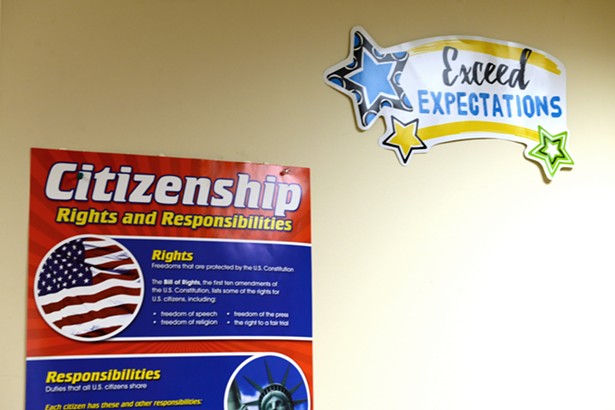
The West Hill Refugee Welcome Center is not the only organization in the Capital Region working to positively affect the lives of incoming refugees. It is part of an ecosystem of nonprofits, government agencies, and community organizations working to bridge gaps in every facet of an entrant’s life. The Refugee and Immigrant Support Service of Emmaus runs English courses and prepares job integration services for refugees across the area. The Al-Hidaya Center, a mosque and small Muslim community, operates a weekly soup kitchen that provides meals to 25 different delivery sites, so that refugees in need have consistent food access. Uzma Popal has run that project, now known as the Muslim Soup Kitchen, since 2014. Popal, a Pakistani immigrant and former stay-at-home mom, saw an opportunity to solve a clear inequity in her community through Islamic spaces. They now also run a weekly donation center at a reconstructed Salvation Army, which provides clothes, furniture, and housing essentials for refugees who struggle financially and linguistically to provide for themselves.
These centers have rapidly grown in the months following the Taliban’s summer offensive. Popal says that the donation center used to be appointment-only, but now, with the influx of Afghans, the center has opened its doors, operating every Tuesday and Thursday for anybody who enters.
Doherty has a commanding presence that belies his stature. He moves and dresses with a kind of blue-collar energy: bootcut jeans over stained beige work boots, a Carhartt vest, an ever-present baseball cap pulled tightly over his brow, shielding his eyes. The second time I went up to meet him, he told me to “wear some work clothes and join us for yard work. Come as early as you can.”
The work Doherty does is often quite menial: yard repair, repainting and furnishing homes, replacing bicycles. But his concerns are much larger. “People describe what’s happening with housing and these refugees as a ‘pinch,’” he says. “It’s not a pinch. This is a perfect storm of disaster.” Doherty has tenants living in houses that he rents from other landlords, which sometimes puts him in the position of acting “as a bagman for a slumlord,” as he puts it. “I end up between a rock and a hard place, because the Afghans feel like these landlords are just taking their money. When they come, they feel like this is terrible, but I always tell them, ‘Wait till you hear the stories from other places.’ They just need to have more patience.” This crisis of available quality housing is what plagued Mansour and Shakiba’s family, and with hundreds of refugees entering Albany in the next year, disaster feels like an understatement for what could be coming.
Like Peckenpaugh of USCRI, Doherty is critical of the Department of Social Services’s funding program. “Social Services presents this much benefit for housing, and it’s not near adequate to what the rent costs are right now,” he says. “So people start making side deals with landlords, lying about what the rent is, and then they have to pay them on the side, which is defrauding DSS. Then when it comes time to get citizenship, it’s going to stay on their permanent record that they defrauded DSS.” That can leave refugees with a no-win decision: either face impending homelessness, or take the risk of a permanent criminal record. “It’s like a police state,” Doherty says.
At the center of this impossible choice is an unequal relationship between Afghan refugees and their landlords. During Shakiba and Mansour’s first day in their new home, their landlord asked them whether they knew what carpets, plates, and cups were. “She acted like we had come in from the desert,” Shakiba says. In the weeks that followed, the landlord harassed Shakiba constantly: sending her messages about removing their garbage, warning her about changing the heating in the home, and repeatedly hounding her to keep her door closed. Despite their frustration, Shakiba and Mansour had limited options. USCRI’s absence, and their unfamiliarity with both American housing and the language, meant that they didn’t know how to escape their situation.
Doherty’s center gives him an opportunity to fix that parasitic relationship, even if it is on a smaller scale. West Hill is a poor neighborhood. Redlined and classified as “hazardous” nearly a century ago, the area’s systemic dangers are not lost on Doherty nor the refugees. “Right in this town, you see the school-to-prison track,” he says. “The schools are under-resourced, there’s struggling neighborhoods, they have no chance.” He motioned toward a security tape showing five kids playing right outside the center. “These kids are destined for prison. What a fucking shame.”
Children are Elk Street’s defining feature. At any moment, the street brims with kids playing any games their minds could muster. Despite the hum of traffic, childhood laughter is the neighborhood’s constant sound. It feels joyous, and is a reminder of why so many Afghan refugees persist through the struggles of resettling in the area.
The Reason to Stay
The Taliban’s summer offensive meant irreversible change for those who chose to leave. Hafeez had been scheduled to return to Afghanistan this summer to complete his engagement and start a family. The attack not only made that impossible, but it means his fiance could also be in danger.
But as Hafeez told this story, he couldn’t help but fight back laughter. Midway through our conversation, Noor had shown his youngest brother, Abdullah, a video on his phone, and suddenly giggles had overtaken the room. Abdullah’s laughter was infectious, and a moment of fear had given way to booming howls and screams. This was the nature of their family—while acutely aware of the agony in their lives, they find joy and laughter among themselves. “We’re a very funny family, you see,” Noor says.
A prideful one, too. Noor glows when describing his youngest brother. “Look at him, he’s so smart with his phone,” he says. “He’s so quick, I can barely use my phone.”
Hafeez quickly joined in. “One time, I tried deleting YouTube from his phone. The next day, he just figured out how to download it again. I didn’t even see a touchscreen phone until I was 15. He’s so lucky.”

Hafeez raved about the young child’s future, detailing every opportunity he was going to grab: mastering English, graduating college, getting a job. These were no longer dreams, they were part of the plan. Hafeez pointed up at his wall, where an Afghan flag hung with a tiny American flag peeking out from behind it. It was the only decoration in the room. “Afghan people have a lot of pain,” he says. “He won’t remember Afghanistan. He gets a chance to grow up without the pain that we all have.”
Noor squinted his eyes, as if the point were obvious. “His life is going to be better. So much better.”







